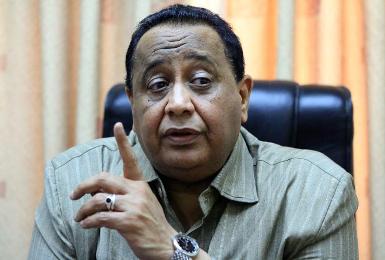INTERVIEW: Sudan says peace in conflict zones could be reached through national dialogue process
August 22, 2014 (BERLIN) – The Sudanese presidential assistant Ibrahim Ghandour said that the African Union (AU) chief mediator Thabo Mbeki will seek to bring rebel groups onboard the national dialogue process which would discuss among other things, ways to end the wars in the Blue Nile, South Kordofan and Darfur should they fail to reach separate peace agreements with them.

“Germany is an important country in the European Union (EU) and we are seeking as a government and a [ruling] party to build strong relationships with European nations and thus when this opportunity arose we wanted to grasp it in order to strengthen bilateral relations and also take advantage of the ties Berlin has and its partnerships with some of the think tanks which have links with the armed rebels because we are working hard to reach an agreement to end the war and to reach peace, but this is only possible through a comprehensive dialogue which must take place inside Sudan so that it includes everyone,” Ghandour said.
Yesterday, the pro-government Ashorooq TV reported that Ghandour is expected to meet in Berlin on Friday with leaders from the opposition and rebel groups.
Ghandour also met with the German foreign minister Frank-Walter Steinmeier upon his arrival in Berlin in talks that dealt with bilateral relations between the two countries.
He pointed out that Mbeki has been responsible since 2009 for the Darfur dossier and then added to his portfolio the Khartoum-Juba relations. Later and through UN Security Council (UNSC) Resolution 2046 he became responsible for the peace talks between the Sudan People Liberation Movement North (SPLM-N) and the Sudanese government.
“In order to accomplish peace, we are seeking peace agreements in Addis Ababa and Doha forums concerning the Two Areas and Darfur and then shift inside to a comprehensive dialogue which is attended by everyone to negotiate on other issues,” the Sudanese official said.
“If we are unable to do this, then we will work with Mbeki and the international community to persuade rebels to join the national dialogue which seeks peace in conflict zones. If we reach an agreement then this is the required goal and if we disagree then they have the right to return to their battlefield and fight again” he added.
The AUHIP head is expected to fly to Doha soon with the joint chief mediator Mohamed Ibn Chambs fro consultations with the Qatari deputy prime minister Ahmed bin Abdullah Al Mahmoud over the participation of the rebel groups in Darfur in the dialogue process.
MAHDI PARTICIPATION IN THE DIALOGUE
Ghandour expressed hope that leader of the National Umma Party (NUP) al-Sadiq al-Mahdi would rejoin the dialogue as well as other parties which boycotted it adding that the government is working hard to make that happen.
“The seat of al-Sadiq al-Mahdi in Sudan and in Sudanese politics will remain vacant and we believe that the previous injuries since 1989 have been overcome and this one too will be overcome,” the ruling party official said.
“We look forward to have people rise above their grudges and come to dialogue because it is about the future of the nation,” he added.
The Sudanese President Omer Hassan al-Bashir launched an initiative for national dialogue last January but the process suffered a major setback after the withdrawal of the National Umma Party (NUP) and the boycott of leftist forces and rebels.
The opposition alliance of the National Consensus Forces (NCF), gathering left forces, boycotted the political roundtable, asking the government first to stop war and create a conducive environment for the dialogue.
Al-Mahdi’s NUP suspended its participation in this political process after his detention last May and maintained its opposition even after his subsequent release.
Earlier this month, he signed with the rebel alliance of the Sudan Revolutionary Front (SRF) a declaration of principles to achieve peace and democratic reforms in Sudan.
The government rejected the declaration saying it opens the door for external intervention in the Sudanese internal affairs. Khartoum also rebuffed a cessation of hostility for two months offered by the rebels as gesture of goodwill.
Last week, the Sudanese security services arrested his daughter Mariam who is also his deputy as she returned from Paris following the signing of Paris declaration.
On Mariam’s case he said that she will be investigated and then released “as she is detained on specific charges according to the law but we hope she is set free”.
“We do not believe that any politician should be arrested without charge and therefore we hope that either she faces clear charges and sent to trial or release her and this will happen God willing,” Ghandour said.
(ST)
